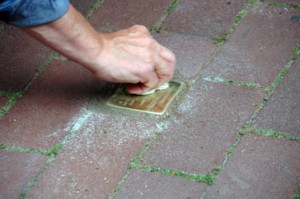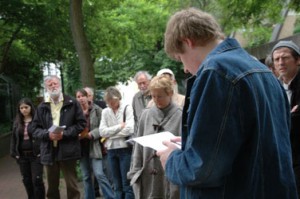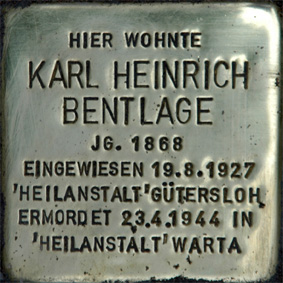This part is under construction
Bentlage, Karl
Karl Bentlage was born in Minden 20th June, 1868, was also known under the second Christian name of Heinrich. His father, Johann Heinrich Bentlage, was a glazier by trade but, in other documents, was  said to be a locksmith. His mother was Charlotte Luise Bentlage, nee´ Boeger, her widowed name being Thomas. Karl was christened a protestant and had seven siblings. At the time of his birth the family lived at ‘The Railway Station’. He learnt the trade of book printer, which he practiced for many years, eventually as maschine foreman. He never married. His military service was with the Infantry Regiment No. 15 in Minden. At some point in time, which can’t be determined from the documents, he lived with his sister, Friedrike Bentlage at Poettcherstrasse 13. Remarks in his medical record suggest that other siblings lived in the same household.
said to be a locksmith. His mother was Charlotte Luise Bentlage, nee´ Boeger, her widowed name being Thomas. Karl was christened a protestant and had seven siblings. At the time of his birth the family lived at ‘The Railway Station’. He learnt the trade of book printer, which he practiced for many years, eventually as maschine foreman. He never married. His military service was with the Infantry Regiment No. 15 in Minden. At some point in time, which can’t be determined from the documents, he lived with his sister, Friedrike Bentlage at Poettcherstrasse 13. Remarks in his medical record suggest that other siblings lived in the same household.
During the 1920’s it seems that Karl Bentlage showed signs of having a psychological illness. It could have been as the result of a working accident in which he received head injuries. He was admitted to the Minden Hospital on 7th August, 1927, a doctor’s report suggesting that he had behaved violently towards his sister. The doctor wrote that his mental state had changed drastically during the past five years. The changes that he showed were mistrust, a vi olent temper and hallucinations, he hardly left the house and neglected his work. The Doctor’s report suggested he was a danger to his sisters. In a later letter, written by the sisters on 15th December, 1928, at a time when Karl was already in the Sanatorium, they stated that their brother had made life very difficult for them, this being confirmed by medical statements.
olent temper and hallucinations, he hardly left the house and neglected his work. The Doctor’s report suggested he was a danger to his sisters. In a later letter, written by the sisters on 15th December, 1928, at a time when Karl was already in the Sanatorium, they stated that their brother had made life very difficult for them, this being confirmed by medical statements.
On 15th August, 1927, the Police Administration, Minden, stated that they had no objections with regard him being committed to an institution. On 19th August, 1927, Karl Bentlage was admitted to the provincial sanatorium in Guetersloh. The Registration Attestation certified arterial-sclerotic madness with no hope of recovery.
The same assessment was repeated in his medical records during the following years. He was quiet and orderly, he worked in the stores and was always hard working but was introvert and had nothing to do with other patients and the longer he stayed in the institution the more he hallucinated. In 1941 the medical records showed him as being autistic and certified him as schizophrenic. In a fall during December, 1942, he fractured the neck of the femur and became disabled.
On 14th October, 1943, he was discharged from Guetersloh and was admitted to the District Sanatorium, Warta in Poland. Warta belonged to the German occupied Poland and was the so called Reich’s Area, Wartheland. The Sanatorium there had been re-functioned as an extermination establishment for the national socialist’s euthanasia program. It has to be accepted that patients from the mental homes who were sent from Reich’s territory to Warta were destined for euthanasia murder, as was Karl Bentlage.
On 21st February, 1944, Frieder ike Bentlage received the answer, from Warta, to her enquiry as to the physical and psychological condition of her brother, that it was unchanged. He was quiet, caused no problems, his appetite was good and he slept well. Karl Bentlage died on 23rd April, 1944. There is no information as to the circumstances surrounding his death. The cause of his death stated on the death certificate was that of ‘old age’.
ike Bentlage received the answer, from Warta, to her enquiry as to the physical and psychological condition of her brother, that it was unchanged. He was quiet, caused no problems, his appetite was good and he slept well. Karl Bentlage died on 23rd April, 1944. There is no information as to the circumstances surrounding his death. The cause of his death stated on the death certificate was that of ‘old age’.
The following situation is typical. The Bentlage sisters were informed, telegraphically, that the funeral of their brother was on 27th April at 11am. But the telegram didn’t arrive until 26th April causing Friederike Bentlage to write that, due to the short notice the siblings couldn’t attend the funeral.

